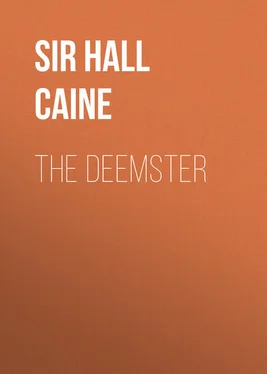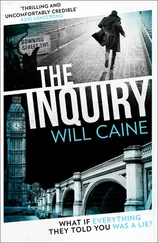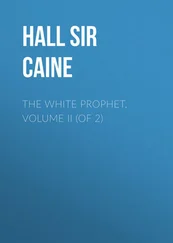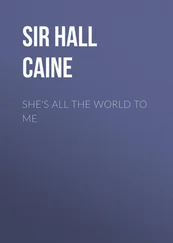Hall Caine - The Deemster
Здесь есть возможность читать онлайн «Hall Caine - The Deemster» — ознакомительный отрывок электронной книги совершенно бесплатно, а после прочтения отрывка купить полную версию. В некоторых случаях можно слушать аудио, скачать через торрент в формате fb2 и присутствует краткое содержание. ISBN: , Жанр: foreign_antique, foreign_prose, на английском языке. Описание произведения, (предисловие) а так же отзывы посетителей доступны на портале библиотеки ЛибКат.
- Название:The Deemster
- Автор:
- Жанр:
- Год:неизвестен
- ISBN:http://www.gutenberg.org/ebooks/35781
- Рейтинг книги:5 / 5. Голосов: 1
-
Избранное:Добавить в избранное
- Отзывы:
-
Ваша оценка:
- 100
- 1
- 2
- 3
- 4
- 5
The Deemster: краткое содержание, описание и аннотация
Предлагаем к чтению аннотацию, описание, краткое содержание или предисловие (зависит от того, что написал сам автор книги «The Deemster»). Если вы не нашли необходимую информацию о книге — напишите в комментариях, мы постараемся отыскать её.
The Deemster — читать онлайн ознакомительный отрывок
Ниже представлен текст книги, разбитый по страницам. Система сохранения места последней прочитанной страницы, позволяет с удобством читать онлайн бесплатно книгу «The Deemster», без необходимости каждый раз заново искать на чём Вы остановились. Поставьте закладку, и сможете в любой момент перейти на страницу, на которой закончили чтение.
Интервал:
Закладка:
The Deemster
CHAPTER I
THE DEATH OF OLD EWAN
Thorkell Mylrea had waited long for a dead man's shoes, but he was wearing them at length. He was forty years of age; his black hair was thin on the crown and streaked with gray about the temples; the crow's-feet were thick under his small eyes, and the backs of his lean hands were coated with a reddish down. But he had life in every vein, and restless energy in every limb.
His father, Ewan Mylrea, had lived long, and mourned much, and died in sorrow. The good man had been a patriarch among his people, and never a serener saint had trod the ways of men. He was already an old man when his wife died. Over her open grave he tried to say, "The Lord gave, and the Lord hath taken away; blessed – " But his voice faltered and broke. Though he lived ten years longer, he held up his head no more. Little by little he relinquished all active interest in material affairs. The world had lost its light for him, and he was traveling in the dusk.
On his sons, Thorkell, the elder, Gilcrist, the younger, with nearly five years between them, the conduct of his estate devolved. Never were brothers more unlike. Gilcrist, resembling his father, was of a simple and tranquil soul; Thorkell's nature was fiery, impetuous, and crafty. The end was the inevitable one; the heel of Thorkell was too soon on the neck of Gilcrist.
Gilcrist's placid spirit overcame its first vexation, and he seemed content to let his interests slip from his hands. Before he was out Thorkell Mylrea was in effect the master of Ballamona; his younger brother was nightly immersed in astronomy and the Fathers, and the old man was sitting daily, in his slippers, in the high-backed armchair by the ingle, over which these words were cut in the black oak: "God's Providence is mine inheritance."
They were strange effects that followed. People said they had never understood the extraordinary fortunes of Ballamona. Again and again the rents were raised throughout the estate, until the farmers cried in the grip of their poverty that they would neither go nor starve. Then the wagons of Thorkell Mylrea, followed close at their tail-boards by the carts of the clergy, drove into the cornfields when the corn was cut, and picked up the stooks and bore them away amid the deep curses of the bare-armed reapers, who looked on in their impotent rage.
Nevertheless, Thorkell Mylrea said, far and wide, without any show of reserve, and with every accent of sincerity, that never before had his father's affairs worn so grave a look. He told Ewan as much time after time, and then the troubled old face looked puzzled. The end of many earnest consultations between father and son, as the one sat by the open hearth and the other leaned against the lettered ingle, was a speedy recourse to certain moneys that lay at an English bank, as well as the old man's signature to documents of high moment.
Old Ewan's spirits sank yet lower year by year, but he lived on peacefully enough. As time went by, he talked less, and his humid eyes seemed to look within in degree as they grew dim to things without. But the day came at length when the old man died in his chair, before the slumberous peat fire on the hearth, quietly, silently, without a movement, his graspless fingers fumbling a worm-eaten hour-glass, his long waves of thin white hair falling over his drooping shoulders, and his upturned eyes fixed in a strong stare on the text carved on the rannel-tree shelf, "God's Providence is mine inheritance."
That night Thorkell sat alone at the same ingle, in the same chair, glancing at many parchments, and dropping them one by one into the fire. Long afterward, when idle tongues were set to wag, it was said that the elder son of Ewan Mylrea had found a means whereby to sap away his father's personalty. Then it was remembered that through all his strange misfortunes Thorkell had borne an equal countenance.
They buried the old man under the elder-tree by the wall of the churchyard that stands over against the sea. It seemed as if half of the inhabitants of the island came to his funeral, and six sets of bearers claimed their turn to carry him to the grave. The day was a gloomy day of winter; there was not a bird or a breath in the heavy air; the sky was low and empty; the long dead sea was very gray and cold; and over the unplowed land the withered stalks of the last crop lay dank on the mold. When the company returned to Ballamona they sat down to eat and drink and make merry, for "excessive sorrow is exceeding dry." No one asked for the will; there was no will because there was no personalty, and the lands were by law the inheritance of the eldest son. Thorkell was at the head of his table, and he smiled a little, and sometimes reached over the board to touch with his glass the glass that was held out toward him. Gilcrist had stood with these mourners under the empty sky, and his heart was as bare and desolate, but he could endure their company no longer. In an agony of grief and remorse, and rage as well, he got up from his untouched food and walked away to his own room. It was a little, quiet nest of a room that looked out by one small window over the marshy Curraghs that lay between the house and the sea. There Gilcrist sat alone that day in a sort of dull stupor.
The daylight had gone, and the revolving lamps on the headland of Ayre were twinkling red after black over the blank waters, when the door opened and Thorkell entered. Gilcrist stirred the fire, and it broke into a bright blaze. Thorkell's face wore a curious expression.
"I have been thinking a good deal about you, Gilcrist; especially during the last few days. In fact, I have been troubled about you, to say the truth," said Thorkell, and then he paused. "Affairs are in a bad way at Ballamona – very."
Gilcrist made no response whatever, but clasped his hands about his knee and looked steadily into the fire.
"We are neither of us young men now, but if you should think of – of – anything, I should consider it wrong to stand – to put myself in your way – to keep you here, that is – to your disadvantage, you know."
Thorkell was standing with his back to the fire, and his fingers interlaced behind him.
Gilcrist rose to his feet. "Very well," he said, with a strained quietness, and then turned toward the window and looked out at the dark sea. Only the sea's voice from the shore beyond the churchyard broke the silence in that little room.
Thorkell stood a moment, leaning on the mantel-shelf, and the flickering lights of the fire seemed to make sinister smiles on his face. Then he went out without a word.
Next morning, at daybreak, Gilcrist Mylrea was riding toward Derby Haven with a pack in green cloth across his saddle-bow. He took passage by the "King Orry," an old sea-tub plying once a week to Liverpool. From Liverpool he went on to Cambridge to offer himself as a sizar at the University.
It had never occurred to any one that Thorkell Mylrea would marry. But his father was scarcely cold in his grave, the old sea-tub that took his brother across the Channel had hardly grounded at Liverpool, when Thorkell Mylrea offered his heart and wrinkled hand, and the five hundred acres of Ballamona, to a lady twenty years of age, who lived at a distance of some six miles from his estate. It would be more precise to say that the liberal tender was made to the lady's father, for her own will was little more than a cypher in the bargaining. She was a girl of sweet spirit, very tender and submissive, and much under the spell of religious feeling. Her mother had died during her infancy, and she had been brought up in a household that was without other children, in a gaunt rectory that never echoed with children's voices. Her father was Archdeacon of the island, Archdeacon Teare; her own name was Joance.
Читать дальшеИнтервал:
Закладка:
Похожие книги на «The Deemster»
Представляем Вашему вниманию похожие книги на «The Deemster» списком для выбора. Мы отобрали схожую по названию и смыслу литературу в надежде предоставить читателям больше вариантов отыскать новые, интересные, ещё непрочитанные произведения.
Обсуждение, отзывы о книге «The Deemster» и просто собственные мнения читателей. Оставьте ваши комментарии, напишите, что Вы думаете о произведении, его смысле или главных героях. Укажите что конкретно понравилось, а что нет, и почему Вы так считаете.












